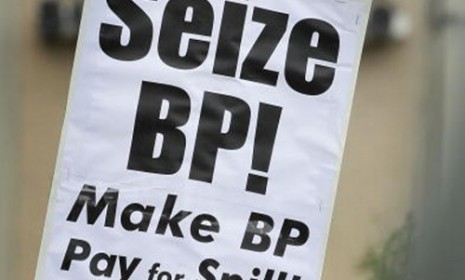BP oil spill: Accident, or crime?
Environmental law experts say criminal charges are likely over the Gulf of Mexico oil disaster. Are they warranted?

A free daily email with the biggest news stories of the day – and the best features from TheWeek.com
You are now subscribed
Your newsletter sign-up was successful
Legal analysts say the government is likely to file criminal charges against at least one of the companies connected to the massive oil spill in the Gulf of Mexico. Well-owner BP and its partners — TransOcean, which operated the drilling rig that exploded, and Halliburton, which installed a well plug that failed — have pointed fingers at one another in congressional hearings; each denies being primarily at fault for the spill. Is the Gulf disaster just an unfortunate accident — or is it a crime? (Watch Rep. Bart Stupak cite BP's "culture of incompetence")
With evidence piling up, criminal charges are a given: Investigators are turning up clear "evidence of negligence," says Gus Lubin in Business Insider, "including a blowout preventer that was out of batteries and hadn't been properly tested." So, sit tight — it's "obvious" someone is going to face criminal charges. The only question is, who?
The Week
Escape your echo chamber. Get the facts behind the news, plus analysis from multiple perspectives.

Sign up for The Week's Free Newsletters
From our morning news briefing to a weekly Good News Newsletter, get the best of The Week delivered directly to your inbox.
From our morning news briefing to a weekly Good News Newsletter, get the best of The Week delivered directly to your inbox.
Those charges need to entail some serious jail time: This is the "worst case criminal negligence" I've ever seen, says Tom Degan in LA Progressive. There's equipment available that could have prevented the leak, but these companies, out of "greed and stupidity," couldn't be bothered to make sure the well was safe. Somebody should go to prison for this, but, given the government's history of coddling the oil industry, "don't hold your breath."
Criminal charges don't seem warranted: The shocking revelations of the missteps that let this happen "are the grits and grease" of standard civil lawsuits, says Tulane University environmental law professor Oliver Houck, as quoted by McClatchy. But "to get into criminal land," the government has to prove the companies "knew that the short cuts they were taking brought a high probability of serious risk." And there's no proof of that.
"Criminal charges likely from Gulf oil spill, legal experts say"
A free daily email with the biggest news stories of the day – and the best features from TheWeek.com
-
 Political cartoons for February 15
Political cartoons for February 15Cartoons Sunday's political cartoons include political ventriloquism, Europe in the middle, and more
-
 The broken water companies failing England and Wales
The broken water companies failing England and WalesExplainer With rising bills, deteriorating river health and a lack of investment, regulators face an uphill battle to stabilise the industry
-
 A thrilling foodie city in northern Japan
A thrilling foodie city in northern JapanThe Week Recommends The food scene here is ‘unspoilt’ and ‘fun’